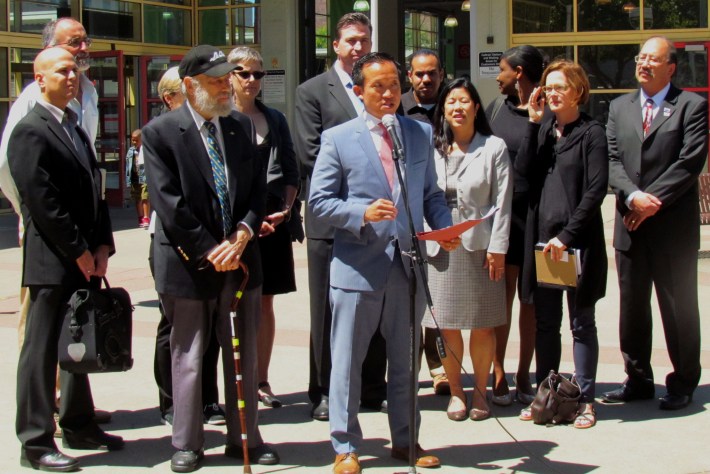
On Friday, in separate press events in Los Angeles and San Francisco, several members of the California legislature presented new bills for consideration in the ongoing legislative special session on transportation funding.
Various estimates put California's backlog of deferred road maintenance in the $100-plus-billion range. The special sessions, which involve the creation of new committees and a parallel legislative process alongside the regular legislative session, are supposed to get legislators working together on ways to solve transportation issues. Already a long list of bills has been introduced—look for more coverage of the process on Streetsblog as the week progresses.
So far the focus has been on how to get money to “fix the potholes,” with Democrats proposing an increase in the gas tax and Republicans calling for putting cap-and-trade revenue towards road maintenance (a ludicrous and likely illegal idea).
Now legislators are finally making the connection between public transit—which has its own daunting funding backlog—and the rest of the transportation system. “Anyone who hits a pothole or sits in traffic knows that our transportation system is in crisis, but so does anyone who has to rely on a late, crowded bus to work, school, or do errands, or who would take the bus if one was there,” said Assemblymember David Chiu (D-San Francisco) as he introduced the package of bills.
“California needs more transit funding to reduce our greenhouse gas emissions and to prevent gridlock from strangling our economic recovery,” he said.
Assemblymember Kevin Mullin (D-San Mateo) pointed out that fixing congestion has to include better transit options. In the San Francisco Bay Area, the major transit systems including BART, Muni, and AC Transit “are at or near capacity already. Increasing capacity of public transit systems must be part of the solution,” he said.
The proposed bills would triple the diesel fuel tax, with the money to be distributed to all transit agencies in the state, and raise the portion of cap-and-trade money currently allocated to transit. See below for more details.
This was far from the first set of proposals for the special session.
Earlier in the week, a “Fix Our Roads” coalition of groups representing cities, counties, and labor groups announced its legislative priorities. These include investing in freight movement, raising revenue from a broad array of options including tax increases and fees, and focusing on maintaining and rehabilitating the current road system. Unfortunately, according to them, adding lanes to fix congestion fits that category.
During the priorities presentation, Jim Earp, director of the California Alliance for Jobs and a member of the California Transportation Commission, was dismissive of the idea that repaving roads would encourage more driving. “This isn't inducing demand,” he said, “this is fixing problems.”
The Fix Our Roads coalition focus points had nothing to say about transit.
In contrast, at Friday's press event, several speakers reiterated the importance of including public transit in the transportation funding conversation. “The days of ever expanding roadways is over,” said BART director Zakhary Mallet, “and this bill reflects that. If we are to achieve our climate change goals, we need to invest in transit.”
Chanell Fletcher, policy manager for the Safe Routes to Schools National Partnership, pointed out that children rely on transit, walking, and biking to get to school. “Better transit will result in less congestion, especially of trips from parents driving their children to school. Fewer cars will translate into less road damage, and contribute to cleaner air, which is not only a health issue—with asthma a big problem among schoolchildren—but it will also benefit California's climate change goals.”
“We're all stuck in soul-crushing traffic, and we know building more roads is not going to get us out,” said TransForm's regional planning director Joel Ramos after the press event. “And we don't have to force people to take transit. It's about choices. The more people we can get to take transit, the better for people who don't, or can't, take transit.”
A similar press conference took place in Los Angeles at the same time, featuring Assemblymembers Richard Bloom (D-Santa Monica) and Adrin Nazarian (D-Van Nuys), and Senator Ben Allen (D-Santa Monica), flanked by officials from L.A. Metro and southern California transit advocates.
The bills proposed on Friday are:
- SBX 1-7, from Senator Allen, and ABX 1-8, from Assemblymembers Chiu and Bloom: Both bills would triple the diesel fuel tax to raise $300 million for the State Transit Assistance program.
- SBX 1-8, from Senator Jerry Hill (D-San Mateo), and ABX 1-7, from Assemblymember Nazarian: These bills propose an increase in the portion of cap-and-trade funds for the Transit and Intercity Rail Capital Program from ten percent to twenty percent, and for the Low Carbon Operations Program from five percent to ten percent.
Look for more this week from Streetsblog on the special legislative session on transportation and the ideas it is generating.





